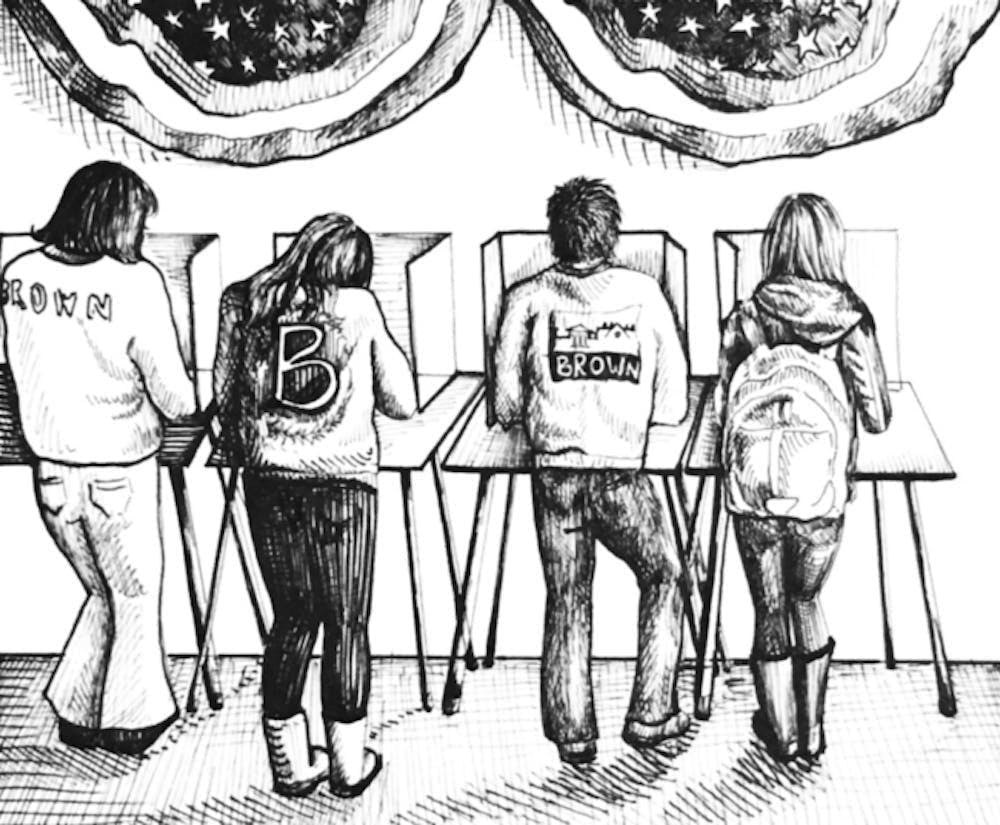For Cara Hutton ’26 and Talia Reiss ’27 — co-presidents of Planned Parenthood Advocates at Brown — abortion rights have been at the top of their minds during this election cycle.
They’re not alone in Brown’s student body. In The Herald’s fall 2024 poll, 47% of respondents who planned to vote ranked reproductive healthcare as a top three issue in the 2024 presidential election.
The importance of reproductive health has been particularly noticeable yet unsurprising, Hutton and Reiss said.
Hutton believes the poll results align with most of the country’s priorities. “Most people want freedom to choose what to do with their bodies,” she added.
According to Hutton, Planned Parenthood Advocates’ first meeting of the year had record attendance among members. Reiss added that the club’s election-focused events — such as postcard writing and phone banking for pro-choice candidates in swing states — have also seen higher turnout and increased energy.
Reiss believes this increased involvement is driven by the Dobbs decision, which overturned Roe v. Wade, and people being “acutely aware of what the Trump presidency did for reproductive rights.” She added that “another Trump presidency would have similar, if not worse, effects.”
“If you’re saying that your priority is reproductive rights, then it’s really all of our responsibility to do that work,” Reiss told The Herald. “Especially given that we live in Rhode Island, where we have so many protections.”
Mahir Rahman ’26, president of Brown Democrats, noted a similar increase in turnout and excitement within the club this year, especially after Vice President Kamala Harris replaced President Joe Biden as the Democratic nominee this summer.
Rahman said that when he met with members of the executive board over the summer, they preferred Harris over Biden and were energized by her entrance into the race.
But while this enthusiasm hasn’t faltered among the general body, it has been adversely impacted by Harris’s stances on the war in Israel and Palestine, Rahman believes. He said that voters across the country have raised similar concerns, especially in the swing states of Michigan, Pennsylvania and Georgia.
Despite personal objections to the Democratic Party’s handling of the Israel-Hamas war, Rahman, who is Muslim, along with other club members, is still campaigning for Harris.
“Harris is the stronger choice in protecting minorities and personal freedoms in this country,” Rahman said.
91% of respondents to The Herald’s poll indicated that they plan to vote for Harris.
A representative from Brown Republicans did not respond to multiple interview requests from The Herald.
As the election approaches, anxiety among Brown Democrats and Planned Parenthood Advocates has increased.
Hutton is frightened about the impact of the election on women and members of other marginalized identities. Rahman described the upcoming election as “nerve-wracking,” with many in Brown Democrats feeling anxious amid tightening polls.
Plus, some states are making it harder to vote, said Logan Tullai ’25, the national president of Every Vote Counts, a nonpartisan organization that looks to increase voter registration.
Leah Carey ’25 — who advertises voting to student-athletes as a part of the national nonprofit The Team — recalled the barriers she had to face when requesting her own absentee ballot. Carey, who moved from California to Texas, said that it was much more difficult for her to obtain an absentee ballot in Texas than it was in California due to differing policies.
But some states have increased voting access in recent years, according to Tullai. For example, the passage of the 2022 “Let RI Vote Act” made some pandemic-era voting-accessibility policies permanent.
Every Vote Counts has also seen an increase in student involvement and enthusiasm, Tullai said.
At Brown, the integration of TurboVote into the Brown app and student accounts has allowed Every Vote Counts to reach all voters across campus, including those missed by tabling events.
Both Tullai and Everton Prospere ’27 — the director of legislative advocacy for Every Vote Counts and the president of its Brown chapter — emphasized the importance of civic engagement in maintaining the stability of U.S. democracy. Tullai also highlighted the importance of down-ballot races, noting that change can originate from the community level and that participation is key to a healthy society.
For students who are ineligible to vote, Tullai and Prospere said that volunteering on campaigns and testifying in the state legislature are alternative ways to get involved. Carey added students can be civically engaged and spread information on registration and elections on social media.
“Democracy” was ranked as the second most important issue to Brown undergraduates in The Herald’s poll.
“Democracy only functions when people get involved,” Prospere said, noting that youth aged 18-29 have the lowest turnout rate among all age groups.
“Students, young individuals have a big voice,” he said. “It’s an unawakened voice that is essentially not being used.”
Manav is a junior from Indiana, concentrating in International and Public Affairs. In his free time, he likes attempting the daily Connections puzzle or falling down Wikipedia rabbit holes.





